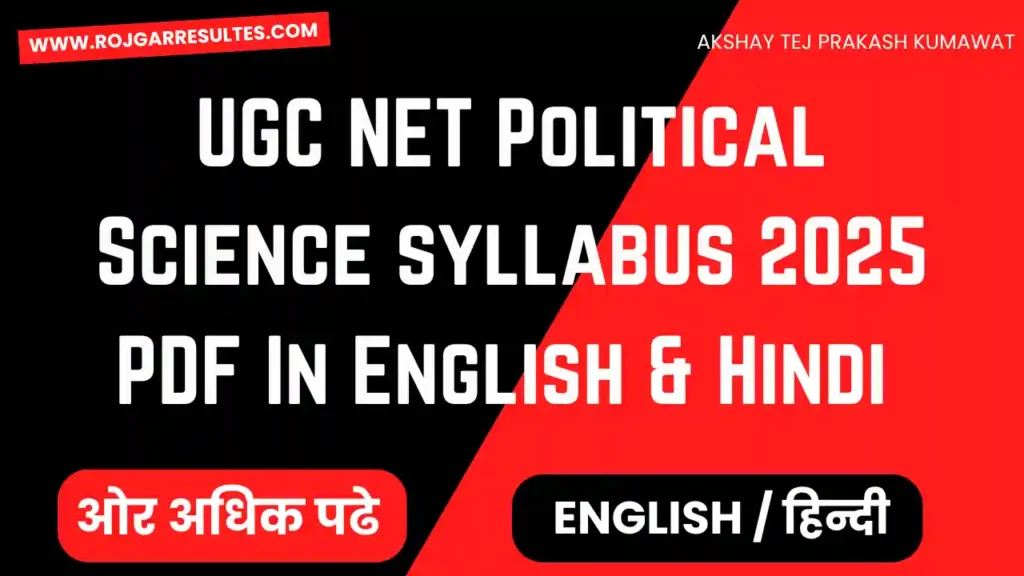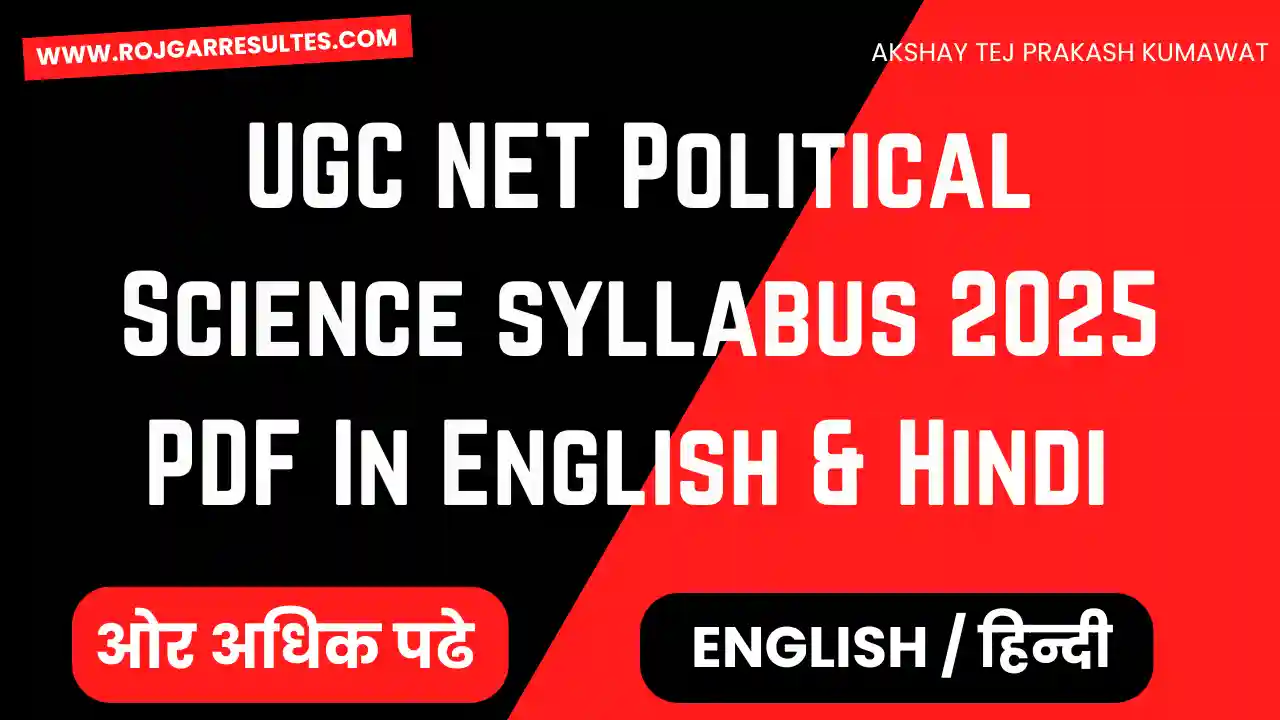UGC NET Political Science Syllabus 2025 is officially prescribed by the University Grants Commission (UGC) and conducted by the National Testing Agency (NTA).
This exam determines the eligibility of candidates for the post of Assistant Professor or Junior Research Fellowship (JRF) in Indian universities and colleges.
UGC NET Political Science Paper 2 Syllabus Pdf . This post provides a detailed and well-structured explanation of every unit, along with preparation insights and key highlights.
Overview of UGC NET Political Science 2025 Exam
| Particulars | Details |
|---|---|
| Exam Name | UGC NET 2025 |
| Conducting Body | National Testing Agency (NTA) |
| Subject Name | Political Science |
| Subject Code | 02 |
| Exam Mode | Online (CBT) |
| Papers | Paper 1 (General) & Paper 2 (Subject-Specific) |
| Total Marks | 300 Marks (100 + 200) |
| Duration | 3 Hours (No Break) |
| Medium | English & Hindi |
UGC NET Political Science Syllabus 2025 (Code No. 02)
1: Political Theory
This unit focuses on fundamental political concepts and ideologies.
Concepts: Liberty, Equality, Justice, Rights, Democracy, Power, Citizenship.
Political Traditions:
- Liberalism
- Conservatism
- Socialism
- Marxism
- Feminism
- Ecologism
- Multiculturalism
- Postmodernism
Focus Tip: Study the evolution of each concept through thinkers like Locke, Rousseau, Marx, and Rawls.
2: Political Thought
Major Thinkers: Confucius, Plato, Aristotle, Machiavelli, Hobbes, Locke, Rousseau, Hegel, Mary Wollstonecraft, John Stuart Mill, Karl Marx, Gramsci, Hannah Arendt, Frantz Fanon, Mao Zedong, John Rawls.
Focus Tip: Compare classical thinkers (Plato, Aristotle) with modern and post-modern thinkers (Marx, Fanon, Arendt).
3: Indian Political Thought
Covers evolution of political ideas in the Indian subcontinent — from ancient texts to modern reformers.
Key Thinkers & Texts:
Dharamshastra, Kautilya (Arthashastra), Aggannasutta, Barani, Kabir, Pandita Ramabai, Bal Gangadhar Tilak, Swami Vivekananda, Rabindranath Tagore, Mahatma Gandhi, Sri Aurobindo, Periyar E.V. Ramasamy, Muhammad Iqbal, M.N. Roy, V.D. Savarkar, Dr. B.R. Ambedkar, Jawaharlal Nehru, Ram Manohar Lohia, Jayaprakash Narayan, Deendayal Upadhyaya.
Focus Tip: Emphasize comparative themes like nationalism, social reform, and modernity.
4: Comparative Political Analysis
Approaches: Institutional, Political Culture, Political Economy, and New Institutionalism.
Topics Covered:
- Colonialism & Decolonization
- Nationalism (European & Non-European)
- State Theory in capitalist/socialist contexts
- Post-colonial & Welfare States
- Political Regimes (Democratic & Non-Democratic)
- Constitutions and Constitutionalism
- Democratization & Development Theories
- Power Structures: ruling class, elites, democratic elitism
- Political Actors: parties, interest groups, NGOs, revolutions
Focus Tip: Use case studies of developed and developing nations to understand comparative frameworks.
5: International Relations
Theoretical Approaches: Idealism, Realism, Structural Marxism, Neoliberalism, Neorealism, Constructivism, Feminism, Postmodernism.
Concepts: State, Sovereignty, Security (traditional & non-traditional).
Key Areas:
- Conflict and Peace
- United Nations (structure & evaluation)
- International Law and ICC
- Globalization & Global Governance (WTO, IMF, World Bank)
- Regional Organisations: EU, AU, SCO, ASEAN
- Global Issues: Terrorism, Climate Change, Human Rights, Migration, Development, Religion, Identity Politics.
Focus Tip: Link theories to real-world examples like Russia-Ukraine conflict, WTO debates, and UN peacekeeping.
6: India’s Foreign Policy
Themes:
- India’s identity as a post-colonial and emerging power
- Continuity & change in foreign policy
- Non-Alignment Movement
- India’s Nuclear Policy
- Relations with USA, Russia, China
- India’s engagement with EU, BRICS, SCO, ASEAN, African Union, GCC
- Neighbourhood policy: SAARC, Gujral Doctrine, Act East / Look West Policy
- Negotiations in international regimes: UN, WTO, IMF, IPCC
- Contemporary Challenges: maritime, energy, cyber, and environmental security
Focus Tip: Study India’s foreign policy in context of global realignments (multipolarity, Indo-Pacific strategy).
7: Political Institutions in India
Key Topics:
- Making of the Indian Constitution
- Constituent Assembly debates
- Philosophy: Preamble, Fundamental Rights, Directive Principles
- Union Executive: President, Prime Minister, Council of Ministers
- Parliament: Structure, Role, Committees
- Judiciary: Judicial Review, Activism, Reforms
- Federalism: Strong Centre, Inter-State Council, Emerging Trends
- Electoral Process & Election Commission
- Local Governments: Panchayati Raj reforms
- Constitutional Bodies: CAG, NHRC, NCW, NCM
Focus Tip: Read recent Supreme Court judgments and amendments for contemporary linkage.
8: Political Processes in India
Core Themes:
- Nature of the Indian State, Economic Planning, NEP, Human Development
- Globalization: Social & Economic Effects
- Social Movements: Dalit, Tribal, Women, Farmers, Labour
- Civil Society & NGOs
- Regionalisation of Indian Politics
- Gender and Politics: Equality & Representation
- Political Parties: National vs State Parties
- Electoral Politics: Participation, Trends
Focus Tip: Current events like women’s reservation, caste census, and regional demands are relevant here.
9: Public Administration
Approaches: Systems Theory, Decision-Making, Ecological Approach.
Key Theories:
- Scientific Management, Rational Choice, NPA, Development Administration, CPA, NPM.
- Organizational Theories: Bureaucratic, Human Relations.
- Leadership & Motivation Theories.
- Communication & Conflict Management (Mary Parker Follett).
- Management by Objectives (Peter Drucker).
Focus Tip: Connect administrative reforms and governance models with modern practices (e-governance, NPM).
10: Governance and Public Policy in India
Topics:
- Monitoring & Evaluation: Jansunwai, Social Audit
- Governance, Good Governance, Democratic Governance
- Accountability & Control: legislative, executive, judicial
- Institutional Mechanisms: RTI, Consumer Protection Act, Citizen’s Charter
- Ombudsman, Lokpal, Lokayukta
- Panchayati Raj & Grassroots Democracy
- Planning & Development: Sustainable, Participatory, e-Governance, NITI Aayog
- Key Public Policies: MNREGA, NRHM, RTE, Food Security

What is the subject code for UGC NET Political Science?
Subject Code: 02
How many units are in the UGC NET Political Science syllabus 2025?
syllabus has 10 units covering political theory, institutions, IR, governance, and more
Where can I get the UGC NET Political Science Syllabus PDF?
You can Get it from the official NTA site ugcnet.nta.ac.in
